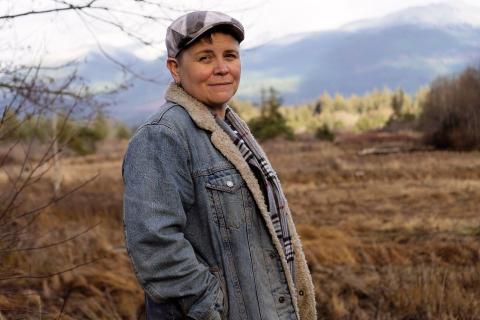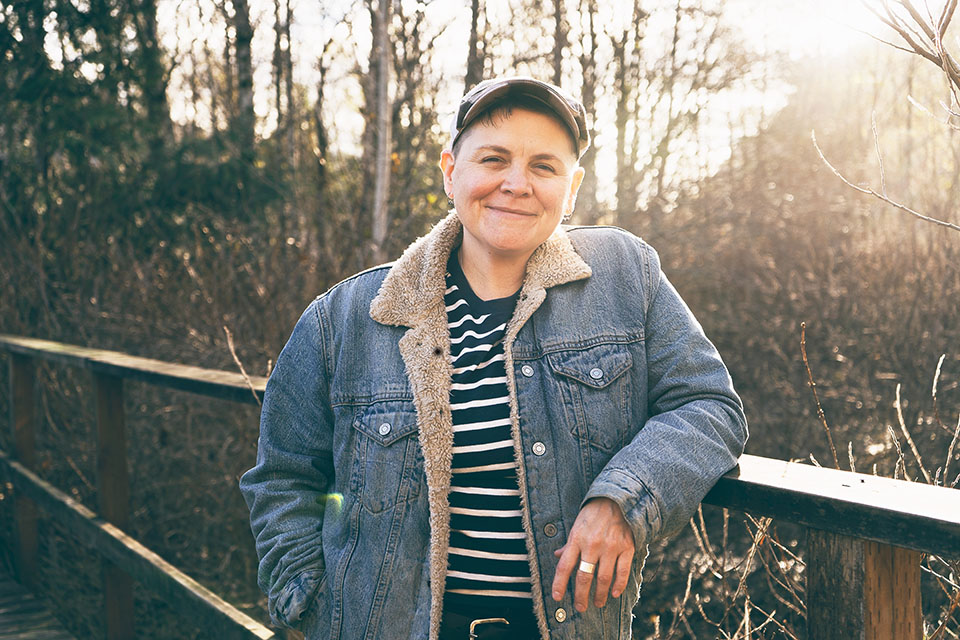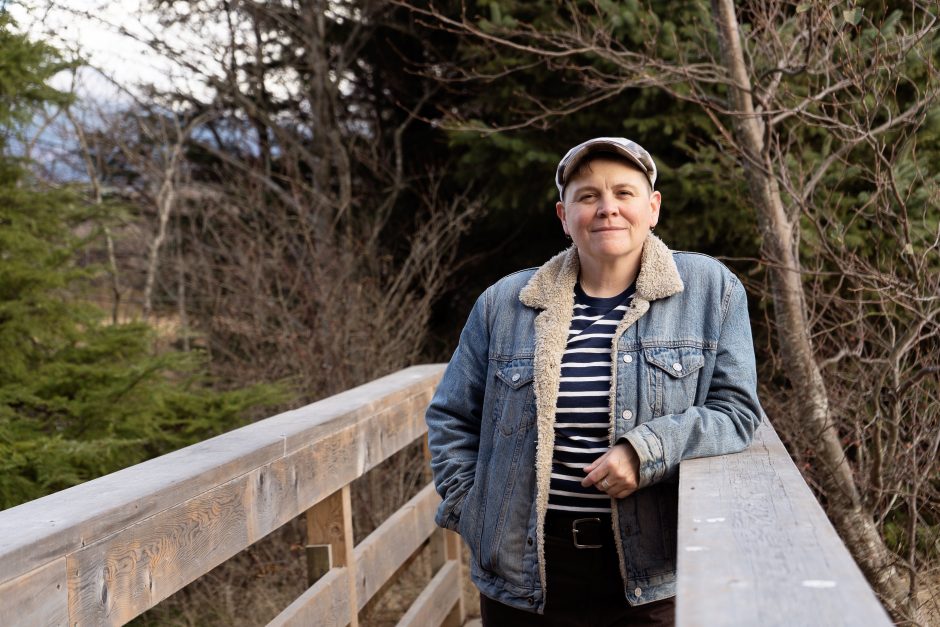BE Brave, BE Relevant, STAY Relevant
“BE CURIOUS. Inspiration, for me, is everything. I run towards big ideas and personal growth – seeking light beneath any rock, around any corner, and within any interaction.”
This interview was first posted by UBC Applied Science, December 2022.

Se:ko! My name is Olivia Maracle, and my pronouns are she/her. I am a daughter, a sister, and a granddaughter. I am of the Turtle Clan and identify as Kanien’kehá:ka (People of the Flint) or Mohawk from the Bay of Quinte. My mother is Susan Cooke, and my father is Gary Maracle. I am the first granddaughter on my father’s side, whose family, for the most part, reside on Tyendinaga Mohawk Territory in Belleville, Ontario. My maternal family lives in Belleville, as well as other areas across Canada. Although I grew up in Ontario and Alberta, I have lived in North Vancouver, British Columbia for most of my adult life.
I have a BA in Psychology/Sociology from the University of Alberta, and a BSN and MSN from the University of British Columbia. I have spent most of my life as a Nurse, first as an Emergency Animal Health Technician, and more recently as a Pediatric RN at BC Women’s and Children’s Hospital.
Niá:wen
Why did you choose to go into your field of study at UBC?
I decided to return to University after many years away because I felt inclined to act. Partially due to the current Canadian political climate, and also because revisiting concepts as a 40-year-old adult is different and feels powerful. I have had experiences, journeys, and subsequent stories within me that I feel may be of use to others. I also have an insatiable need to learn more about myself and about the people and communities I care deeply about.
The path from thought to action interests me. The practice of dismantling assumptions, and refitting pieces together but differently, creates positive change in those lives around us. As I have been a leader, situated as ‘nurse’ for most of my life, who utilizes both an Indigenous and LGBTQ+ lens, I have a unique vantage point. My perspective is inherently unconventional and intersectional.
UBC recognizes and celebrates uniqueness. UBC, as a structure, offers learning that satisfies the drive to connect. The power of connection speaks to the very heart of me. Professors stand with you, supporting your passions. In the last five plus years I have interacted with inspirational academics, artists, writers, and nursing colleagues, all of which are ever willing to toss around ideas with me, encouraging one another’s growth.
Nursing is not what it appears at face value. Yes, it is health care – hands on policy change, it is working directly with people for long hours, and it is assistance in the journey of human healing, but it is also so much more. I wouldn’t have known it, had I not had an opportunity to study at UBC.
Nursing is solidly situated in critical thinking. Which includes learning leadership concepts, theories that move people through and forward. It is here, deep within these processes, that have I been able to consider topics that interest me, such as Indigenous leadership, and how it differs from the cues and rules we have come to know as the only truth. In amongst the dialogue and the mish mash of what are often colonial concepts, there are people from different backgrounds, within academia, that have been able to recreate, reemerge, and take up space as one’s own. And it is there, where I have found a home of my own.

What has made your time at UBC memorable?
I completed a SPAR (Scholarly Practice Advancement Research project) which combined many of the items I learned within my BSN and MSN program. My SPAR was on Indigenous leadership, which includes a 200-page paper and YouTube documentary. Months upon months of preparation allowed me time to consider concepts learned through my studies, subsequently stumbling upon a difference between what I thought to be true and what is actually true – and why. We are unable to categorize Indigenous leadership, as leadership exists in the Western world.
Through interviews with my own Aunties, the film walks the viewer through essential historical and present-day colonial influences including the aftereffects of those pressures, exclusions, and traumas. Squinting through the smoke that is the complex relationship between Canada and Indigenous Peoples was unbelievably hard. It was difficult for me and my family. Themes and topics that arose include Indigenous introductions, the Indigenous spokesperson, minority stress, equity, assimilation, leadership as a concept that grows over time, jack of all trades, storytelling, realism, selflessness, Canadian tensions, racism, and the residential school system.
I learned about deeper reds and softer hue of yellow. I learned about my relations – what can be spoken and what was not whispered. I learned what is real and brave and present – all of which have impacted in my life. A mentor of mine, a Nursing leadership professor at UBC, recognized my opinion and passion, and agreed – these new findings, this angle, this lens, was missing in the current curriculum. Upon completion of this project, the information provided/learned has since been included in the MSN leadership courses. THAT is the change that is possible with UBC. And that is why I continue to be interested in academic participation. You can be passionate, and you can create change.
How are you applying the skills you learned through your studies at UBC?
I am an RN, and I participate in discourse around the care of communities and patients daily. Learning alternative perspectives, including history pieces which require ongoing revisitation to clarify current situations, offers new information, and makes way for more thoughtful engagement. The teaching aspect comes naturally to me possibly because I am older and have lived examples to add. As an older-ish adult, unless I can apply information learned directly, there is a possibility it may lose vibrancy in my memory. Participating in discussions reinforces concepts for myself and my colleagues and particularly interesting to me are the unique needs of patients related to personal space, care, safety, and safekeeping. This is where relevancy comes in. To learn something is one thing but application it is really the key.
What advice would you give a student entering your degree program?
I would first examine your motivation. Next, think about:
- What energizes you, inspires you?
- What are you passionate about?
- Who do you consider your mentors and muses, and why?
- Who are the groups and communities that you identify and connect solidly with that lift you up and celebrate you, and you them?
- Think about where you want to utilize your energy, your time, focus your attention?
- What worlds do you find yourself within or are drawn toward, and how might your unique gifts and insights safely benefit them?
- What sorts of projects are you drawn to, interested in, or run towards?
- What might you consider your life’s work?
- It is always a good idea to seek out others who have taken the program that interests you – where are they now? How did the program change them? Where are they having impact? What did they learn? Do they love their career? What do they find challenging? What more work must be done?
The MSN curriculum takes time, thoughtful contemplation, and expends personal energy. You will have to switch shifts and find time to study theorists and concepts, seek out knowledge, participate in research, and connect with other learners and academics.
REMEMBER: this is all about learning. YOUR learning. YOUR growth. So, take your time. BE INFLUENCED. LISTEN to what others have to offer and ENJOY yourself. BE INTERSECTIONAL. BE OPEN to change. BE WILLING to EXPERIENCE INNOVATION. ASK QUESTIONS. STAY INVESTED in BIG IDEAS.
Ultimately, these are gifts given to yourself. However, the bright energy that will delightfully spin out from within you, will without question, positively impact others.

Do you believe your education or accomplishments at UBC will have an impact on the future of work?
My SPAR had impact on the MSN leadership curriculum. Before my project, there was little to no Indigenous influence in some core areas. As I was allowed and encouraged to be innovative, I was able to tap into my own gifts and connections. I was able to focus more deeply on some of the concepts that came up within my BSN program, some of which due to my own personal research. As I have always struggled with identity, trying to define a line that felt somewhat blurred at times. I wanted to explore Canadian Indigenous history, lineage and background, and the beauty of Indigenous leadership. My Aunties consented to this grand journey with me. We explored topics like assimilation and generational trauma. It was a very difficult journey for us. Actively listening to the ongoing impacts of colonialism on my beloved family members retriggered words for me like racism, that have in my opinion, lost public impact.
The information from these interviews presented in a film and essay, is an experience shared with the viewer. Reading dates and happenings is one thing but participating in learning by listening and watching is another. It is the full picture, unsifted storytelling, that is critical to this project and exactly the type of learning I wanted to offer. As mentioned, information from this project has now been included the MSN leadership curriculum. That is influential, not just to MSN learners, but to anyone who stumbles across the film publicly on YouTube. That is an intersectional planted seed of change.
Many students have said that having role models related to their identity is important.
I might not use the term ‘role models,’ possibly because I am now 45-years-old…but also possibly because that implies hierarchy. I am not a believer in hierarchy. In my mind, information moves towards and away from people simultaneously. I reach out to others, and others reach out to me. The combination always becomes something new, another big idea, perhaps an ah-ha moment, or at the very least, something novel to roll around in one’s mind. Although knowledge is presented in a certain way, we individually transform it into something else. This energy (ATP/neuronal) combines with another’s impression on/of you in how information is relayed, (suggestive of interpretation complexities), and so on. This is the power of connection!
I have many muses and mentors in the LGBTQ+ and Indigenous world – potentially because I identify as both Indigenous (Mohawk) and as a lesbian, but also because these are groups and minority or marginalized communities that interest me deeply. I am influenced and I influence equally. We are drawn to our communities and sameness (tribalism) for safety and safe keeping. Who I am and how I identify will always influence what I do. I use an Indigenous lens, as much as I use an LGBTQ+ lens. I think of them as a sepia to my world – they will always inform my academic and professional experiences. These are worlds important to me. They include comrades I walk alongside, inspiration blooming back and forth, encouragement and words of wisdom shared, and we journey on. This is pride and happiness to me, and I wish to focus my attention and academic experience directly here.